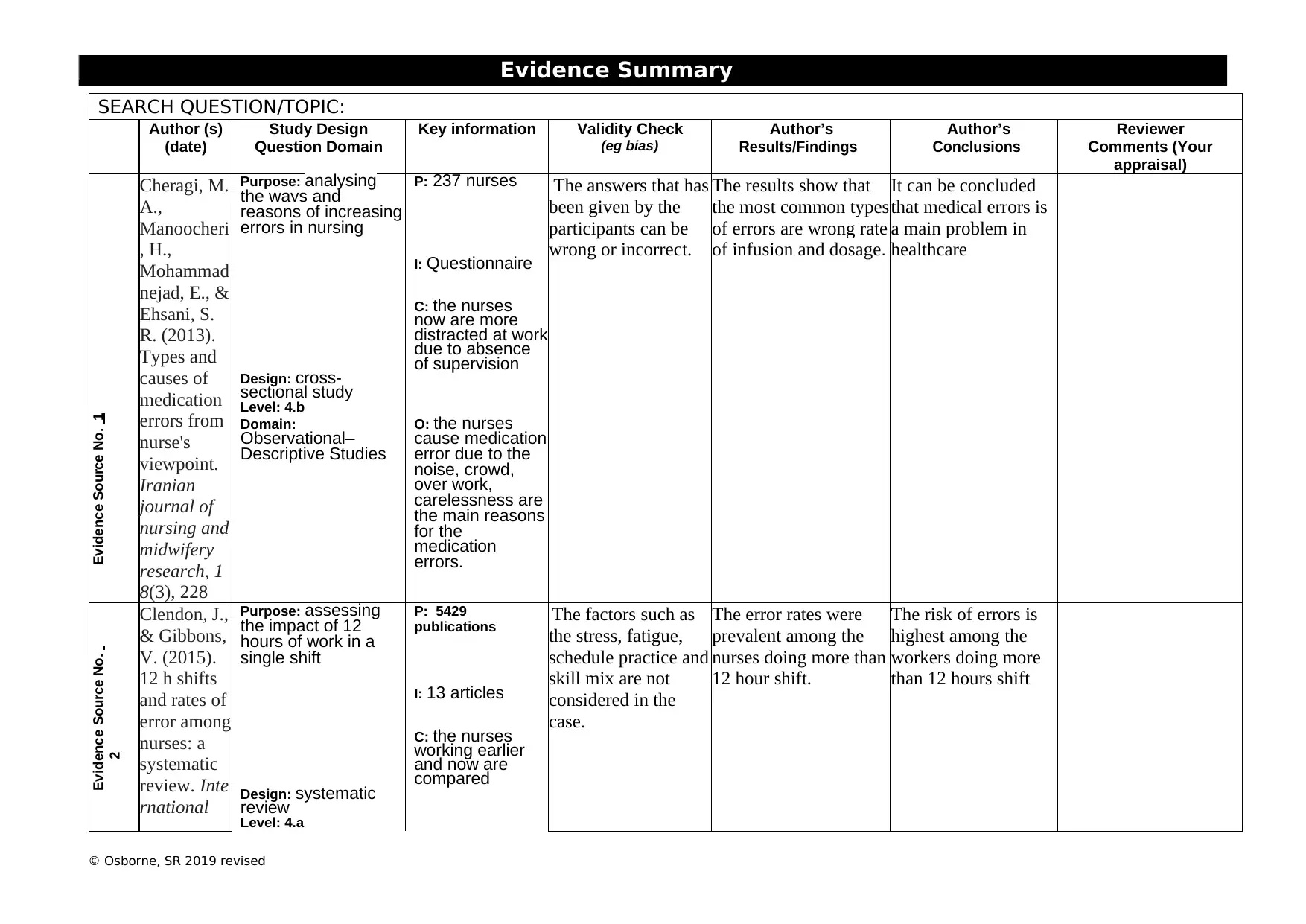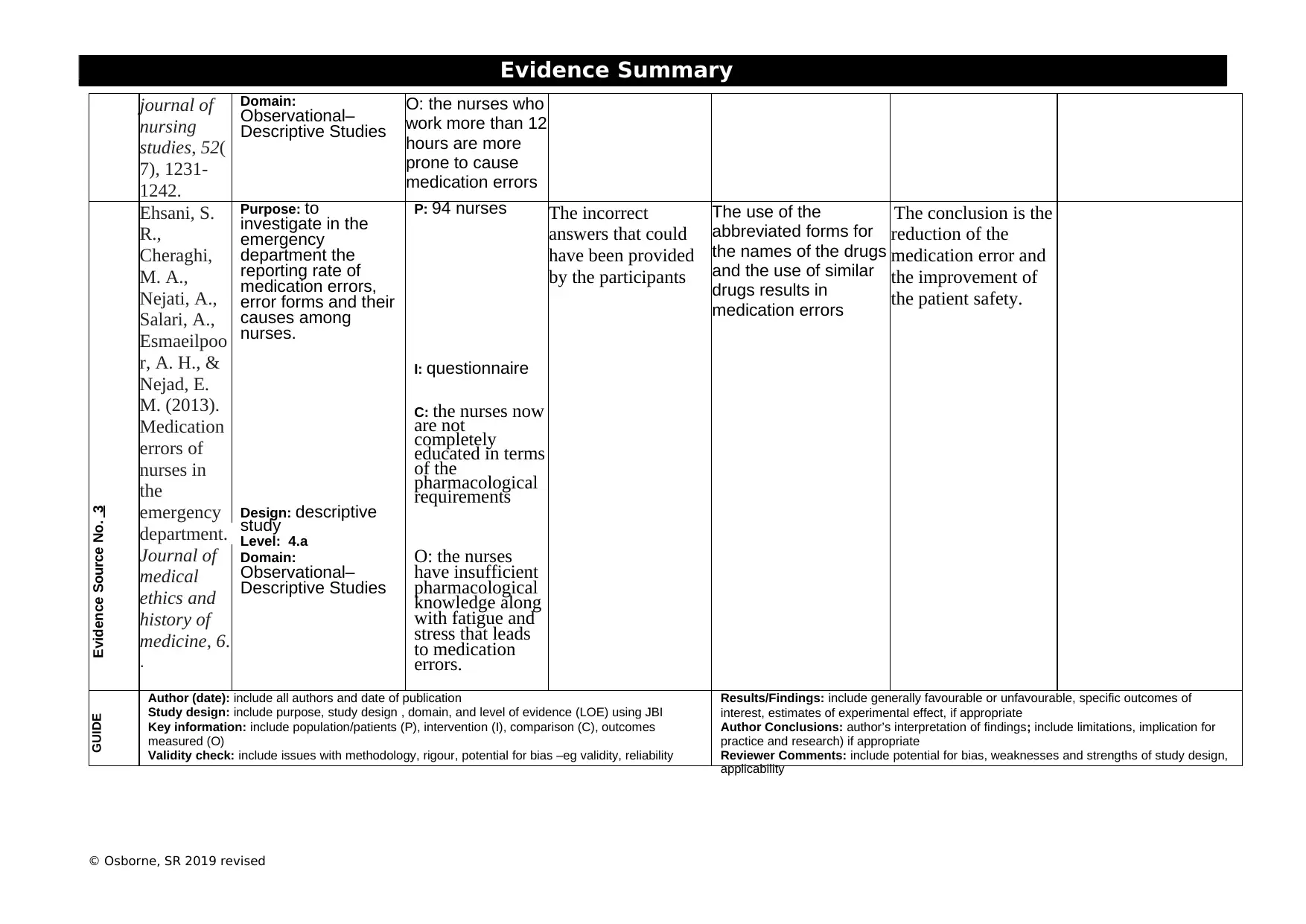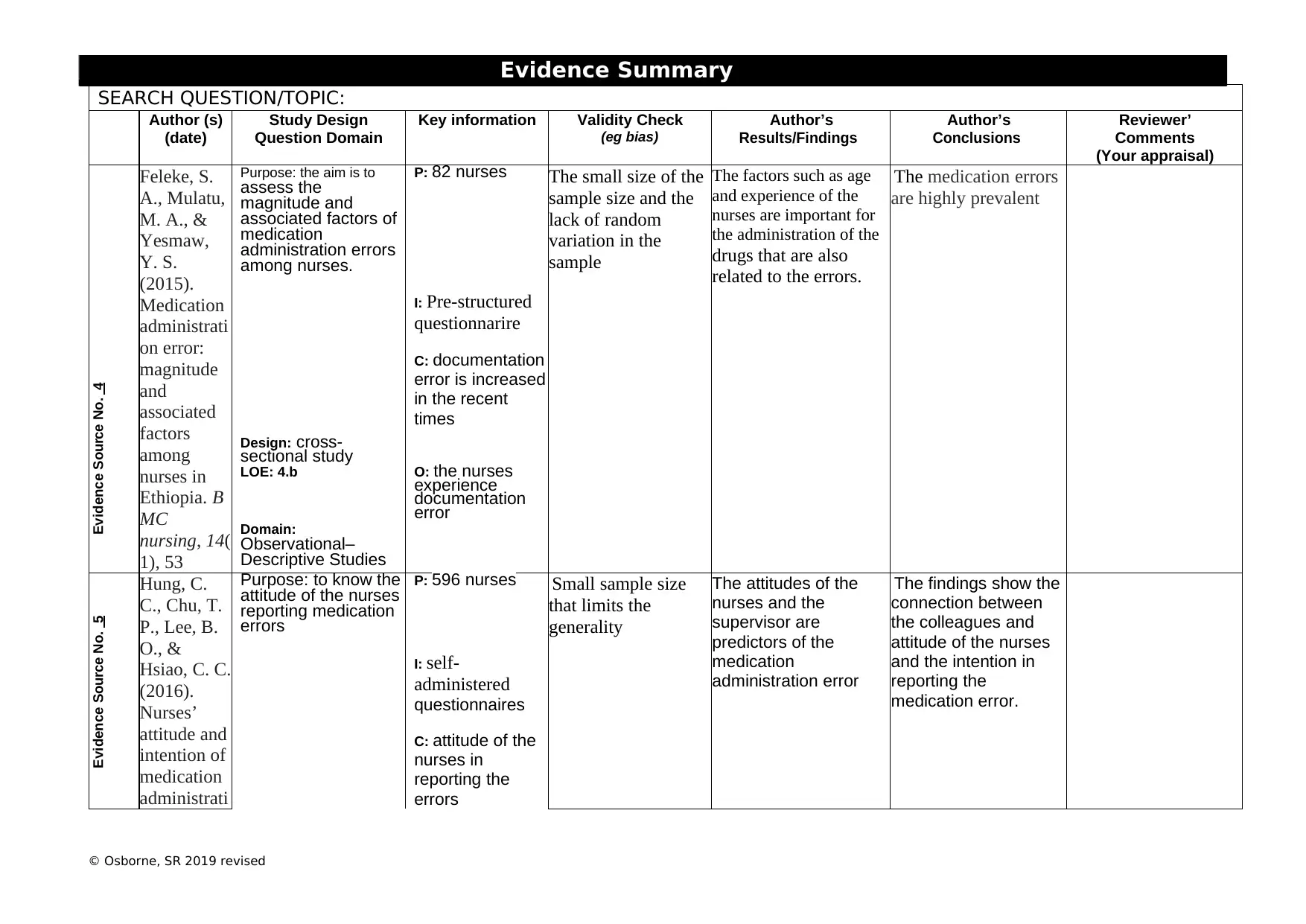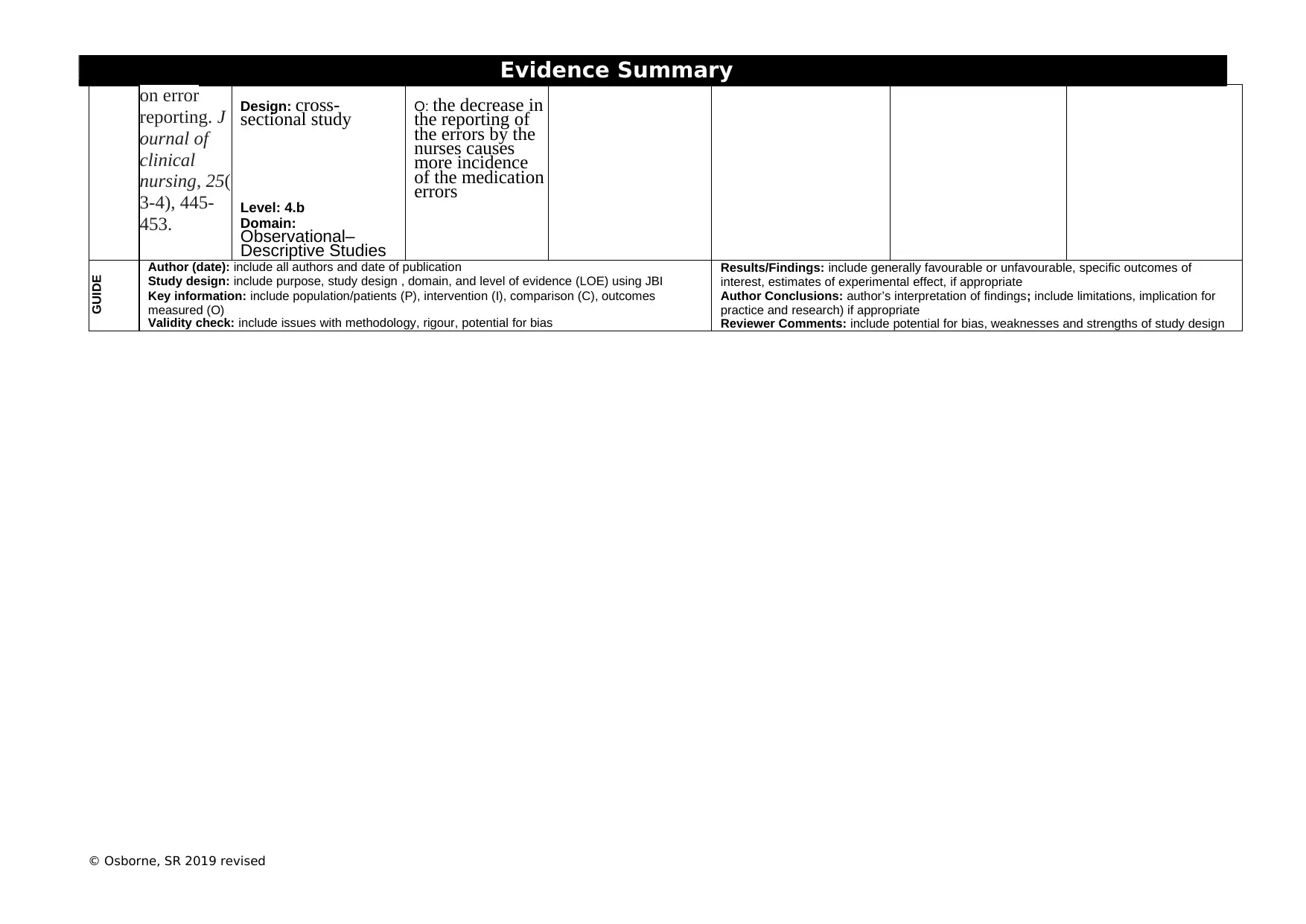NUR2300 Evidence-Based Nursing Practice Report Analysis
VerifiedAdded on 2022/11/22
|4
|1160
|433
Report
AI Summary
This report, prepared for a Nursing and Midwifery course, focuses on evidence-based nursing practice. It begins with an outline of a clinical issue, emphasizing the significance and impact of the problem, supported by existing literature. The core of the report is an evidence summary table, which synthesizes findings from multiple research studies on medication errors. Each study is meticulously analyzed, including study design, key information (population, intervention, comparison, outcomes), validity checks, results, conclusions, and reviewer comments. The report adheres to a structured guide, ensuring a comprehensive evaluation of the evidence. The studies reviewed explore various factors contributing to medication errors, such as nurse workload, knowledge gaps, and reporting behaviors. The report aims to demonstrate a beginning understanding of evidence-based nursing practice in addressing local health needs and improving quality of care.

Evidence Summary
Table
© Osborne, SR 2019 revised
SEARCH QUESTION/TOPIC:
Author (s)
(date)
Study Design
Question Domain
Key information Validity Check
(eg bias)
Author’s
Results/Findings
Author’s
Conclusions
Reviewer
Comments (Your
appraisal)
Evidence Source No. 1
Cheragi, M.
A.,
Manoocheri
, H.,
Mohammad
nejad, E., &
Ehsani, S.
R. (2013).
Types and
causes of
medication
errors from
nurse's
viewpoint.
Iranian
journal of
nursing and
midwifery
research, 1
8(3), 228
Purpose: analysing
the ways and
reasons of increasing
errors in nursing
P: 237 nurses The answers that has
been given by the
participants can be
wrong or incorrect.
The results show that
the most common types
of errors are wrong rate
of infusion and dosage.
It can be concluded
that medical errors is
a main problem in
healthcare
I: Questionnaire
C: the nurses
now are more
distracted at work
due to absence
of supervision
Design: cross-
sectional study
Level: 4.b
Domain:
Observational–
Descriptive Studies
O: the nurses
cause medication
error due to the
noise, crowd,
over work,
carelessness are
the main reasons
for the
medication
errors.
Evidence Source No.
2
Clendon, J.,
& Gibbons,
V. (2015).
12 h shifts
and rates of
error among
nurses: a
systematic
review. Inte
rnational
Purpose: assessing
the impact of 12
hours of work in a
single shift
P: 5429
publications The factors such as
the stress, fatigue,
schedule practice and
skill mix are not
considered in the
case.
The error rates were
prevalent among the
nurses doing more than
12 hour shift.
The risk of errors is
highest among the
workers doing more
than 12 hours shift
I: 13 articles
C: the nurses
working earlier
and now are
compared
Design: systematic
review
Level: 4.a
Table
© Osborne, SR 2019 revised
SEARCH QUESTION/TOPIC:
Author (s)
(date)
Study Design
Question Domain
Key information Validity Check
(eg bias)
Author’s
Results/Findings
Author’s
Conclusions
Reviewer
Comments (Your
appraisal)
Evidence Source No. 1
Cheragi, M.
A.,
Manoocheri
, H.,
Mohammad
nejad, E., &
Ehsani, S.
R. (2013).
Types and
causes of
medication
errors from
nurse's
viewpoint.
Iranian
journal of
nursing and
midwifery
research, 1
8(3), 228
Purpose: analysing
the ways and
reasons of increasing
errors in nursing
P: 237 nurses The answers that has
been given by the
participants can be
wrong or incorrect.
The results show that
the most common types
of errors are wrong rate
of infusion and dosage.
It can be concluded
that medical errors is
a main problem in
healthcare
I: Questionnaire
C: the nurses
now are more
distracted at work
due to absence
of supervision
Design: cross-
sectional study
Level: 4.b
Domain:
Observational–
Descriptive Studies
O: the nurses
cause medication
error due to the
noise, crowd,
over work,
carelessness are
the main reasons
for the
medication
errors.
Evidence Source No.
2
Clendon, J.,
& Gibbons,
V. (2015).
12 h shifts
and rates of
error among
nurses: a
systematic
review. Inte
rnational
Purpose: assessing
the impact of 12
hours of work in a
single shift
P: 5429
publications The factors such as
the stress, fatigue,
schedule practice and
skill mix are not
considered in the
case.
The error rates were
prevalent among the
nurses doing more than
12 hour shift.
The risk of errors is
highest among the
workers doing more
than 12 hours shift
I: 13 articles
C: the nurses
working earlier
and now are
compared
Design: systematic
review
Level: 4.a
Paraphrase This Document
Need a fresh take? Get an instant paraphrase of this document with our AI Paraphraser

Evidence Summary
Table
© Osborne, SR 2019 revised
journal of
nursing
studies, 52(
7), 1231-
1242.
Domain:
Observational–
Descriptive Studies
O: the nurses who
work more than 12
hours are more
prone to cause
medication errors
Evidence Source No. 3
Ehsani, S.
R.,
Cheraghi,
M. A.,
Nejati, A.,
Salari, A.,
Esmaeilpoo
r, A. H., &
Nejad, E.
M. (2013).
Medication
errors of
nurses in
the
emergency
department.
Journal of
medical
ethics and
history of
medicine, 6.
.
Purpose: to
investigate in the
emergency
department the
reporting rate of
medication errors,
error forms and their
causes among
nurses.
P: 94 nurses The incorrect
answers that could
have been provided
by the participants
The use of the
abbreviated forms for
the names of the drugs
and the use of similar
drugs results in
medication errors
The conclusion is the
reduction of the
medication error and
the improvement of
the patient safety.
I: questionnaire
C: the nurses now
are not
completely
educated in terms
of the
pharmacological
requirements
Design: descriptive
study
Level: 4.a
Domain:
Observational–
Descriptive Studies
O: the nurses
have insufficient
pharmacological
knowledge along
with fatigue and
stress that leads
to medication
errors.
GUIDE Author (date): include all authors and date of publication
Study design: include purpose, study design , domain, and level of evidence (LOE) using JBI
Key information: include population/patients (P), intervention (I), comparison (C), outcomes
measured (O)
Validity check: include issues with methodology, rigour, potential for bias –eg validity, reliability
Results/Findings: include generally favourable or unfavourable, specific outcomes of
interest, estimates of experimental effect, if appropriate
Author Conclusions: author’s interpretation of findings; include limitations, implication for
practice and research) if appropriate
Reviewer Comments: include potential for bias, weaknesses and strengths of study design,
applicability
Table
© Osborne, SR 2019 revised
journal of
nursing
studies, 52(
7), 1231-
1242.
Domain:
Observational–
Descriptive Studies
O: the nurses who
work more than 12
hours are more
prone to cause
medication errors
Evidence Source No. 3
Ehsani, S.
R.,
Cheraghi,
M. A.,
Nejati, A.,
Salari, A.,
Esmaeilpoo
r, A. H., &
Nejad, E.
M. (2013).
Medication
errors of
nurses in
the
emergency
department.
Journal of
medical
ethics and
history of
medicine, 6.
.
Purpose: to
investigate in the
emergency
department the
reporting rate of
medication errors,
error forms and their
causes among
nurses.
P: 94 nurses The incorrect
answers that could
have been provided
by the participants
The use of the
abbreviated forms for
the names of the drugs
and the use of similar
drugs results in
medication errors
The conclusion is the
reduction of the
medication error and
the improvement of
the patient safety.
I: questionnaire
C: the nurses now
are not
completely
educated in terms
of the
pharmacological
requirements
Design: descriptive
study
Level: 4.a
Domain:
Observational–
Descriptive Studies
O: the nurses
have insufficient
pharmacological
knowledge along
with fatigue and
stress that leads
to medication
errors.
GUIDE Author (date): include all authors and date of publication
Study design: include purpose, study design , domain, and level of evidence (LOE) using JBI
Key information: include population/patients (P), intervention (I), comparison (C), outcomes
measured (O)
Validity check: include issues with methodology, rigour, potential for bias –eg validity, reliability
Results/Findings: include generally favourable or unfavourable, specific outcomes of
interest, estimates of experimental effect, if appropriate
Author Conclusions: author’s interpretation of findings; include limitations, implication for
practice and research) if appropriate
Reviewer Comments: include potential for bias, weaknesses and strengths of study design,
applicability

Evidence Summary
Table
© Osborne, SR 2019 revised
SEARCH QUESTION/TOPIC:
Author (s)
(date)
Study Design
Question Domain
Key information Validity Check
(eg bias)
Author’s
Results/Findings
Author’s
Conclusions
Reviewer’
Comments
(Your appraisal)
Evidence Source No. 4
Feleke, S.
A., Mulatu,
M. A., &
Yesmaw,
Y. S.
(2015).
Medication
administrati
on error:
magnitude
and
associated
factors
among
nurses in
Ethiopia. B
MC
nursing, 14(
1), 53
Purpose: the aim is to
assess the
magnitude and
associated factors of
medication
administration errors
among nurses.
P: 82 nurses The small size of the
sample size and the
lack of random
variation in the
sample
The factors such as age
and experience of the
nurses are important for
the administration of the
drugs that are also
related to the errors.
The medication errors
are highly prevalent
I: Pre-structured
questionnarire
C: documentation
error is increased
in the recent
times
Design: cross-
sectional study
LOE: 4.b O: the nurses
experience
documentation
error
Domain:
Observational–
Descriptive Studies
Evidence Source No. 5
Hung, C.
C., Chu, T.
P., Lee, B.
O., &
Hsiao, C. C.
(2016).
Nurses’
attitude and
intention of
medication
administrati
Purpose: to know the
attitude of the nurses
reporting medication
errors
P: 596 nurses Small sample size
that limits the
generality
The attitudes of the
nurses and the
supervisor are
predictors of the
medication
administration error
The findings show the
connection between
the colleagues and
attitude of the nurses
and the intention in
reporting the
medication error.
I: self-
administered
questionnaires
C: attitude of the
nurses in
reporting the
errors
Table
© Osborne, SR 2019 revised
SEARCH QUESTION/TOPIC:
Author (s)
(date)
Study Design
Question Domain
Key information Validity Check
(eg bias)
Author’s
Results/Findings
Author’s
Conclusions
Reviewer’
Comments
(Your appraisal)
Evidence Source No. 4
Feleke, S.
A., Mulatu,
M. A., &
Yesmaw,
Y. S.
(2015).
Medication
administrati
on error:
magnitude
and
associated
factors
among
nurses in
Ethiopia. B
MC
nursing, 14(
1), 53
Purpose: the aim is to
assess the
magnitude and
associated factors of
medication
administration errors
among nurses.
P: 82 nurses The small size of the
sample size and the
lack of random
variation in the
sample
The factors such as age
and experience of the
nurses are important for
the administration of the
drugs that are also
related to the errors.
The medication errors
are highly prevalent
I: Pre-structured
questionnarire
C: documentation
error is increased
in the recent
times
Design: cross-
sectional study
LOE: 4.b O: the nurses
experience
documentation
error
Domain:
Observational–
Descriptive Studies
Evidence Source No. 5
Hung, C.
C., Chu, T.
P., Lee, B.
O., &
Hsiao, C. C.
(2016).
Nurses’
attitude and
intention of
medication
administrati
Purpose: to know the
attitude of the nurses
reporting medication
errors
P: 596 nurses Small sample size
that limits the
generality
The attitudes of the
nurses and the
supervisor are
predictors of the
medication
administration error
The findings show the
connection between
the colleagues and
attitude of the nurses
and the intention in
reporting the
medication error.
I: self-
administered
questionnaires
C: attitude of the
nurses in
reporting the
errors
⊘ This is a preview!⊘
Do you want full access?
Subscribe today to unlock all pages.

Trusted by 1+ million students worldwide

Evidence Summary
Table
© Osborne, SR 2019 revised
on error
reporting. J
ournal of
clinical
nursing, 25(
3-4), 445-
453.
Design: cross-
sectional study O: the decrease in
the reporting of
the errors by the
nurses causes
more incidence
of the medication
errors
Level: 4.b
Domain:
Observational–
Descriptive Studies
GUIDE Author (date): include all authors and date of publication
Study design: include purpose, study design , domain, and level of evidence (LOE) using JBI
Key information: include population/patients (P), intervention (I), comparison (C), outcomes
measured (O)
Validity check: include issues with methodology, rigour, potential for bias
Results/Findings: include generally favourable or unfavourable, specific outcomes of
interest, estimates of experimental effect, if appropriate
Author Conclusions: author’s interpretation of findings; include limitations, implication for
practice and research) if appropriate
Reviewer Comments: include potential for bias, weaknesses and strengths of study design
Table
© Osborne, SR 2019 revised
on error
reporting. J
ournal of
clinical
nursing, 25(
3-4), 445-
453.
Design: cross-
sectional study O: the decrease in
the reporting of
the errors by the
nurses causes
more incidence
of the medication
errors
Level: 4.b
Domain:
Observational–
Descriptive Studies
GUIDE Author (date): include all authors and date of publication
Study design: include purpose, study design , domain, and level of evidence (LOE) using JBI
Key information: include population/patients (P), intervention (I), comparison (C), outcomes
measured (O)
Validity check: include issues with methodology, rigour, potential for bias
Results/Findings: include generally favourable or unfavourable, specific outcomes of
interest, estimates of experimental effect, if appropriate
Author Conclusions: author’s interpretation of findings; include limitations, implication for
practice and research) if appropriate
Reviewer Comments: include potential for bias, weaknesses and strengths of study design
1 out of 4
Related Documents
Your All-in-One AI-Powered Toolkit for Academic Success.
+13062052269
info@desklib.com
Available 24*7 on WhatsApp / Email
![[object Object]](/_next/static/media/star-bottom.7253800d.svg)
Unlock your academic potential
Copyright © 2020–2026 A2Z Services. All Rights Reserved. Developed and managed by ZUCOL.





